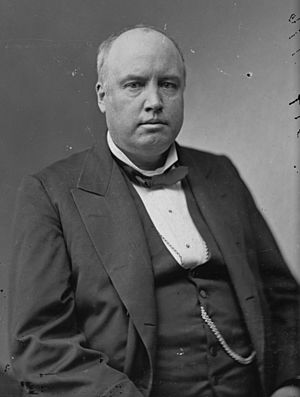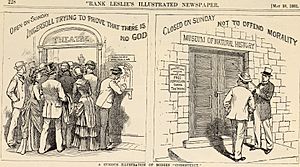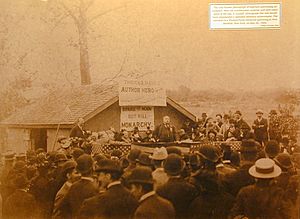Robert G. Ingersoll facts for kids
Quick facts for kids
Robert G. Ingersoll
|
|
|---|---|
 |
|
| Born | Robert Green Ingersoll August 11, 1833 Dresden, New York, U.S. |
| Died | July 21, 1899 (aged 65) Dobbs Ferry, New York, U.S. |
| Resting place | Arlington National Cemetery |
| Occupation | Politician, orator, lecturer |
| Period | 19th century |
| Genre | Satire, essay, social commentary, political commentary, philosophical literature, biblical criticism |
| Subject | Freethought, agnosticism, humanism, abolitionism, women's rights |
| Spouse | Eva Parker Ingersoll |
| Children | Eva Ingersoll Brown Maud Ingersoll Probasco |
| Relatives | Ebon Clarke Ingersoll |
| Signature | |
 |
|
| 16th Attorney General of Illinois | |
| In office 1867–1869 |
|
| Preceded by | Office reestablished |
| Succeeded by | Washington Bushnell |
Robert Green Ingersoll (born August 11, 1833 – died July 21, 1899) was an American lawyer, writer, and speaker. He was known as "the Great Agnostic" because he openly shared his views on agnosticism, which means questioning or not believing in God. He was a very important figure during a time called the Golden Age of Freethought, when people were encouraged to think freely and question traditional ideas.
Contents
About Robert Ingersoll
Robert Ingersoll was born in Dresden, New York. His father, John Ingersoll, was a preacher who believed strongly in ending slavery. Because of his strong opinions, his family moved around a lot. For a while, Robert's father even filled in as a preacher for a famous American speaker named Charles Grandison Finney.
In 1853, Robert, often called "Bob," worked as a teacher in Metropolis, Illinois. He also taught school in Mount Vernon, Illinois before that.
On February 13, 1862, Robert married Eva Amelia Parker. They had two daughters. Their older daughter, Eva Ingersoll-Brown, became a well-known feminist and suffragist, meaning she worked for women's rights, including the right to vote.
His Career as a Lawyer
In 1854, Robert and his brother, Ebon Clarke Ingersoll, became lawyers in Marion, Illinois. People in the area thought the Ingersoll brothers were very smart. However, their views on slavery and religion were not always popular.
Robert learned a lot about law from Judge Willis Allen. He also worked as a deputy clerk, helping with legal paperwork. He moved to Shawneetown, Illinois, and later to Peoria, Illinois, where he and his brother started their own law firm called "E.C. and R.G. Ingersoll."
As a lawyer, Ingersoll worked on several important cases. He defended clients in the "Star Route" trials, a big political case, and his clients were found not guilty. He also defended a man in New Jersey who was accused of speaking against religion. Even though he didn't win that case, his strong defense helped change how such laws were seen, and fewer similar cases happened afterward.
Serving in the Civil War
When the American Civil War began, Robert Ingersoll helped create a group of soldiers called the 11th Regiment Illinois Volunteer Cavalry for the Union Army. He became their commander. His regiment fought in the Battle of Shiloh.
In December 1862, Ingersoll was captured by the Confederates near Lexington, Tennessee. He was later released on "parole," which meant he promised not to fight again until he was officially exchanged for a Confederate soldier. Because he couldn't fight while on parole, he left his role as commander in June 1863.
Entering Politics
After the war, Ingersoll became the Illinois Attorney General, which is the chief lawyer for the state. He was a very active member of the Republican Party. Even though he never held a higher elected office, he was very involved in politics.
In 1876, he gave a famous speech to nominate James G. Blaine for president. This speech, known as the "Plumed Knight" speech, was considered an amazing example of political speaking. Ingersoll's ideas on slavery and women's rights eventually became more accepted. However, his open views on agnosticism prevented him from getting higher political positions. For example, Illinois Republicans once tried to get him to run for governor, but he refused to hide his agnosticism during the campaign.
Public Speaking and Free Thought

Robert Ingersoll was a very popular speaker. In 1880, he was introduced as "the Great Agnostic" before a big speech in Brooklyn. He often spoke about his ideas on "free thought," which meant people should be free to think and question anything, including religious beliefs. He strongly disagreed with the idea of Hell, calling it a cruel concept.
Ingersoll also spoke out against the Chinese Exclusion Act, a law that limited Chinese workers from coming to the United States. He believed in a fairer policy for them.
His Later Life and Legacy
Robert Ingersoll passed away from heart problems at age 65. After his death, his brother-in-law, Clinton P. Farrell, collected his speeches and published them in a 12-volume set called the Dresden Editions. These books helped keep Ingersoll's ideas alive and allowed future generations to read his powerful speeches. His ashes are buried in Arlington National Cemetery.
Ingersoll is credited with helping to bring back the good reputation of Thomas Paine, another famous American thinker. Paine had written that humans, not God, wrote the Bible. Ingersoll shared Paine's ideas in his lectures, introducing them to many new people.
In 2005, a new collection of Ingersoll's writings was published, making his ideas available to an even wider audience today.
Friendship with Walt Whitman
Ingersoll was good friends with the famous poet Walt Whitman. Whitman thought Ingersoll was the best speaker of his time. He said that Ingersoll truly lived the idea of individuality that he wrote about in his poetry.
Ingersoll felt the same way about Whitman. When Whitman died in 1892, Ingersoll gave a moving speech at his funeral. This speech was widely praised and is still considered a classic tribute.
Works
- The gods and other lectures (New York : D. M. Bennett, 1876)
- Some mistakes of Moses (Washington, D.C. : C. P. Farrell, 1879)
- Proceedings of the Civil Rights Mass-Meeting held at Lincoln Hall, October 22, 1883. Speeches of Hon. Frederick Douglass and Robert G. Ingersoll. (Washington, D. C.: C. P. Farrell, 1883)
- Walt Whitman (New York, The Truth Seeker Co, 1890)
- Col. Ingersoll's reply to his critics in the N.Y. "Evening Telegram." (Toronto : J. Spencer Ellis, 1892)
- Shakespeare, a lecture (New York, Farrell, 1895)
- Abraham Lincoln, a lecture (New York, Farrell, 1895)
- Voltaire, a lecture (New York, Farrell, 1895)
- Great speeches of Col. R. G. Ingersoll; complete (Chicago : Rhodes & McClure, 1895)
- "Why I am an agnostic" (1896)
- The works of Robert G. Ingersoll vols. 1, 2, 3, 4, 5, 6, 7, 8, 9, 10, 11, and 12 (New York : The Dresden pub. co., C. P. Farrell, 1902)
See also
 In Spanish: Robert G. Ingersoll para niños
In Spanish: Robert G. Ingersoll para niños
 | Audre Lorde |
 | John Berry Meachum |
 | Ferdinand Lee Barnett |


